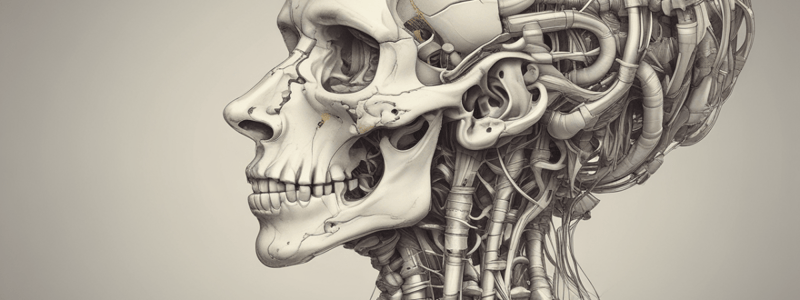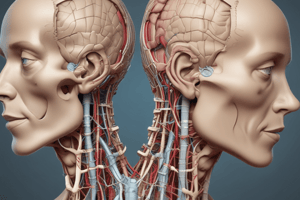Podcast
Questions and Answers
Which characteristic is UNIQUE to the atlas (C1) vertebra?
Which characteristic is UNIQUE to the atlas (C1) vertebra?
- Presence of dens
- Transverse foramen
- Bifid spinous processes
- Lacks a body (correct)
What type of movement is primarily allowed by the atlanto-occipital joint?
What type of movement is primarily allowed by the atlanto-occipital joint?
- Lateral flexion
- Compression
- Nodding (flexion and extension) (correct)
- Rotation
What is the primary function of the atlantoaxial joint?
What is the primary function of the atlantoaxial joint?
- Flexion and extension
- Weight bearing
- Lateral flexion
- Rotation (correct)
Where does the vertebral artery travel after leaving the subclavian artery?
Where does the vertebral artery travel after leaving the subclavian artery?
Which cervical vertebra is characterized by the presence of the dens?
Which cervical vertebra is characterized by the presence of the dens?
Which muscle group can be weakened as a result of forward head posture?
Which muscle group can be weakened as a result of forward head posture?
What biomechanical change occurs in the cervical spine due to forward head posture?
What biomechanical change occurs in the cervical spine due to forward head posture?
Which muscle shortening contributes to forward head posture?
Which muscle shortening contributes to forward head posture?
Which condition is NOT directly mentioned as a result of forward head posture?
Which condition is NOT directly mentioned as a result of forward head posture?
Which of the following is NOT a postural deviation associated with the forward head posture?
Which of the following is NOT a postural deviation associated with the forward head posture?
Which ligament is located anterior to vertebral bodies?
Which ligament is located anterior to vertebral bodies?
Which ligament is thickest in the cervical spine?
Which ligament is thickest in the cervical spine?
Which ligament connects the laminae of each adjacent vertebrae from occiput to sacrum?
Which ligament connects the laminae of each adjacent vertebrae from occiput to sacrum?
Which ligament extends from C7 to the occiput?
Which ligament extends from C7 to the occiput?
Which ligament runs along the spinous processes from C7 to the sacrum?
Which ligament runs along the spinous processes from C7 to the sacrum?
What muscle contracture is associated with torticollis?
What muscle contracture is associated with torticollis?
In which population is torticollis most commonly seen clinically?
In which population is torticollis most commonly seen clinically?
What can cause torticollis in adults?
What can cause torticollis in adults?
What secondary factor can contribute to the development of torticollis?
What secondary factor can contribute to the development of torticollis?
Which condition involves a contracture of the sternocleidomastoid (SCM) muscle?
Which condition involves a contracture of the sternocleidomastoid (SCM) muscle?
Flashcards are hidden until you start studying
Study Notes
Cervical Spine Anatomy
- The cervical spine consists of 7 vertebrae (C1-C7).
- C1 (Atlas) is a ring-shaped vertebra that lacks a body, and its atlanto-occipital joint allows for nodding movement (upper cervical flexion and extension).
- C2 (Axis) has a dens, an upward projection from its body, which allows the atlas to pivot around it, enabling rotation.
- C2-C7 vertebrae have relatively equal flexion, extension, lateral flexion, and rotation.
- The cervical spine is characterized by bifid spinous processes and transverse foramen.
- The vertebral artery travels upward from the subclavian artery via the transverse processes of the C-spine and supplies the basilar artery in the brain.
Cervical Spine Anatomy: Ligaments
- The anterior longitudinal ligament (ALL) is located anterior to the vertebral bodies.
- The posterior longitudinal ligament (PLL) is located posterior to the vertebral bodies and is thickest in the cervical spine.
- The ligamentum flavum connects the laminae of each adjacent vertebra from the occiput to the sacrum.
- The interspinal ligament connects adjacent spines.
- The supraspinal ligament extends from C7 to the sacrum along the spinous processes.
- The nuchal ligament is a fibrous membrane in the C-spine that connects from C7 to the occiput.
Postural Deviations
Forward Head Posture/Position
- Forward head posture is a gradual process that occurs over time and alters the natural lordotic curvature of the C-spine.
- It alters the normal biomechanics in the C-spine.
- Possible causes include:
- Weakness in cervical extensors.
- Shortened cervical flexors.
- Shortened pectoralis major.
- Elongation of cervical extensors.
- Weak scapular retractors.
Postural Deviations
Torticollis
- Torticollis is a pathophysiological condition characterized by contracture of the sternocleidomastoid (SCM) muscle.
- It is commonly seen in infants, but can also occur in adults following prolonged ICU stays.
- The condition is secondary to positioning with the head/neck not in neutral.
Studying That Suits You
Use AI to generate personalized quizzes and flashcards to suit your learning preferences.




